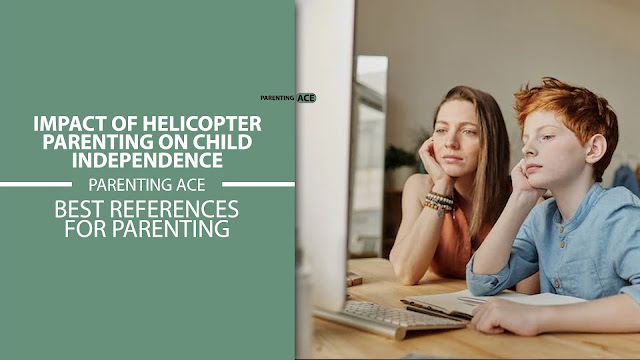The Impact of Helicopter Parenting on a Child's Independence
In the realm of modern parenting, the term "helicopter parenting" has emerged as a topic of considerable debate and scrutiny. This style of parenting, characterized by excessive monitoring and intervention, often stems from a place of deep concern for a child's well-being. However, its impact on a child's journey toward independence is a subject of intense interest and inquiry. As we delve into this complex phenomenon, we explore the delicate balance between nurturing and stifling autonomy, and the profound implications it holds for a child's development and future.
 |
| Impact Of Helicopter Parenting On Child Independence |
How Does Helicopter Parenting Affect A Child's Independence?
In contemporary parenting, the term "helicopter parenting" has gained significant attention. This style of parenting involves an overbearing level of involvement in a child's life, often characterized by excessive monitoring, control, and intervention. While parents may believe they are acting in their child's best interest, the long-term effects of helicopter parenting on a child's development, particularly their independence, are complex and worthy of examination. As a counselor, psychiatrist, and expert in developmental psychology, family psychology, and clinical psychology, I will delve into the intricate dynamics of helicopter parenting and its profound impact on a child's journey toward independence.
The Effects of Helicopter Parenting on Child Independence
Helicopter parenting, while well-intentioned, can inadvertently hinder a child's ability to develop independence. Constant monitoring and intervention deprive children of opportunities to learn from their mistakes, problem-solve, and develop resilience. When parents consistently swoop in to alleviate discomfort or difficulty, children may internalize a sense of learned helplessness, believing they are incapable of managing challenges on their own. This dependence on parental guidance can persist into adolescence and adulthood, impeding the development of essential life skills and decision-making abilities.
Moreover, helicopter parenting can undermine a child's self-confidence and self-esteem. Constant scrutiny and micromanagement communicate to the child that their actions are not trusted or valued, leading to feelings of inadequacy and insecurity. Children raised in this environment may struggle to assert themselves or take initiative in various aspects of their lives, such as academics, social interactions, and career pursuits. As a result, they may become overly reliant on external validation and approval, further perpetuating a cycle of dependence.
Furthermore, helicopter parenting can strain the parent-child relationship. While parents may believe they are fostering closeness and connection by being overly involved, their intrusive behavior can create resentment and friction within the family dynamic. Children may perceive their parents as overbearing and controlling, leading to a breakdown in trust and communication. This strained relationship can impede healthy parent-child boundaries and hinder the child's ability to seek support and guidance when truly needed.
In conclusion, helicopter parenting exerts a profound influence on a child's journey toward independence, shaping their development in nuanced ways. While parents may have the best intentions, excessive control and intervention can impede a child's ability to cultivate autonomy, resilience, and self-confidence. As counselors, psychiatrists, and experts in psychology, it is imperative to educate parents about the importance of fostering independence in children while providing support and guidance in a balanced manner. By encouraging autonomy, promoting healthy boundaries, and cultivating a supportive environment, parents can empower their children to navigate life's challenges with confidence and resilience.




